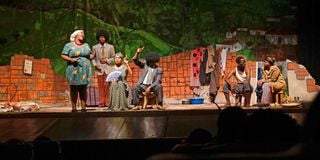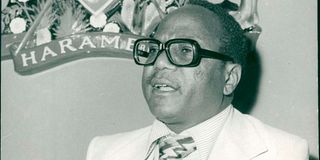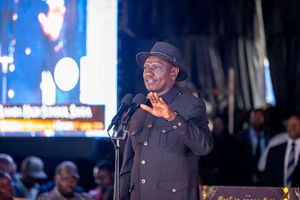
Ahab Kioi (Hamprey Maina, in the grey suit) and his wife Jesebel (Angel Waruinge) sit as Hellen (Diana Wamaitha) prays in a scene during the staging of Ngugi wa Miiri and Ngugi wa Thiong’o’s play ‘I Will Marry When I Want/Ngaahika Ndeenda’ at Kenya National Theatre on October, 10 2022. Ndugire (Duncan Murunyu) and Hellen’s husband are in the background as Kigunda (Bilal Mwaura) and Wangeci (Nice Githinji) are perplexed by all the prayers. PHOTO | POOL
In the late 1980s, a group University of Nairobi students, after months of rehearsals, approached the provincial administration seeking a permit to stage Tewfik al-Hakim’s The Fate of a Cockroach.
As they presented the request, Provincial Commissioner Fred Waiganjo posed an unsettling question: “Who is the cockroach?”
Nyayo House was a notorious space complete with a torture chamber. The students, led by thespian Joni Nderito, exchanged anxious glances. Waiganjo denied them the permit – unless they identified “the cockroach”.
Butere Girls School was in the news this week when its play, Echoes of War by Cleophas Malala, was halted. Someone went to the High Court and obtained an order that triggered anger somewhere and police violence in Nakuru, as officers lobbed teargas at those who had gathered to witness the triumph of justice.
It was not the first time the school was testing the limits of freedom of expression. In April 2013, Justice David Majanja delivered a landmark ruling, lifting the ban on the staging of Butere Girls’ Shackles of Doom that had been halted by Kenya National Drama Festival Executive Secretary Joseph Khaemba during the finals “for promoting hate speech”.

Anti-riot police escort Butere Girls school bus which was ferrying students along 58 road in Nakuru after they declined to perform their play at Melvine Jones academy on April 10, 2025.
“I am not convinced that Kenya is such a weak democracy whose foundation cannot withstand a play by high school students. If our democracy is to flourish, it is students...who must at an early age understand the meaning of freedom,” Justice Majanja said.
He contended that the prohibition amounted to an unjustifiable curtailment of the right to free expression.
“Artistic expression is not merely crafted to gratify the soul. It stirs our conscience so that we can reflect on the difficult questions of the day,” he added.
It now appears there are rules that are not in tandem with the Constitution. The Ministry of Education appears to be trapped in the moribund October 1962 Films and Stage Plays Act, which was enacted two months to independence and was later used to curtail film and theatre.
When that Bill was tabled at the Legislative Council, there were warnings it could kill the creative industry. It was not until 1977 when Kenyans realised the import of that law after Ngũgĩ wa Thiong’o’s play Ngaahika Ndeenda was stopped by Kiambu District Commissioner Eliud Njenga and the writer detained without trial.

Former Kiambu District Commissioner Eliud Njenga who Ngũgĩ wa Thiong’o’s play Ngaahika Ndeenda.
Ngũgĩ’s later said: “He thus plunged a three-year-old communal vision into a sea of sorrow and depression by citing public security. He should have more truthfully cited the public insecurity of a few individuals, who thought their reservoir of cheap labour and sex was threatened by the confidence generated among the villagers by the new theatre.”
The rules being enforced by the ministry trace to June 1982, when Higher Education Minister Joseph Kamotho decreed that high school students would no longer have the right to create plays based on their own themes.
From 1983 onwards, Kamotho ordered that the Director of Higher Education would be responsible for providing the themes for plays presented at the drama festivals. He ruled out any filming of the performances and stipulated that adjudicators would be selected by a committee chaired by the Chief Inspector of Schools.
The year was marked by the resurgence of radical plays. Kilio cha Haki by Alamin Mazrui, staged by Nairobi School, was stopped, and the playwright was among those held without trial. On February 25, 1982 the government stopped the rehearsals of Ngũgĩ’s play Maitu Njugira.

A crowd escort a school bus ferrying Butere Girls’ students from Melvin Jones Academy in Nakuru on April 10, 2025. The learners refused to perform the ‘Echoes of War’ play in the ongoing National Drama and Film Festivals.
Another play that faced a similar fate was Joe De Graft’s Muntu, which, despite being a setbook, was banned from staging by the Higher Education Permanent Secretary in 1982. In the same year, Njumbi High School’s Giki tikio Thuruari by Gachugu Makini was banned from the drama festival. Additionally, Human Nature, a play by Kenya Science Teachers College, was removed from the programme before the start of the drama festival.
(Here is the full script as presented in court): Go to page 11
Though the power of the provincial administration to regulate the staging of plays was removed in 1997, after the licensing requirement for stage plays was repealed amid the opposition-led push for minimum constitutional reforms, it is surprising that 63 years after the Stage Plays Act came into force, we are still clinging to that relic – attempting to extract fragrance from a skunk – by enforcing oppressive measures under the guise of maintaining order, morality or security.
As Malala found out this week, the more things change, the more they remain the same. His depiction of a police state unfolded in real life, as the police brutality portrayed in his play was chillingly re-enacted by officers who teargassed journalists and bystanders. In essence, Butere Girls High School did not need to act out Echoes of War as police themselves delivered a live performance, replicating the very state violence the play sought to expose. This echoed the December 1977 scene in Kamirithu, when police stopped the staging of Ngaahika Ndeenda (I Will Marry When I Want) and later arrived with bulldozers to demolish the village theatre.
That did not end there. When Ngũgĩ was in exile, Kenyan authorities even attempted to persuade then-British Foreign Secretary, Sir Geoffrey Howe, to ban the play The Trial of Dedan Kimathi, which was being staged in London – an impossible request.
Police do not know how to deal with writers. Ngũgĩ later recounted how – after the publishing of his novel Matigari, the eponymous hero became the subject of rumour and excitement.

Journalists barred from entering Melvin Jones Hall to cover the Butere Girls' performance of their controversial play 'Echoes of War'.
“People who had read the novel started talking about Matigari,” he recalled.
“When (President Daniel arap)Moi heard that there was a Kenyan roaming the country asking such (political) questions, he issued orders for the man’s arrest. When the police discovered he was a fictional character, Moi was even angrier and ordered the arrest of the book.”
As a result, police seized every copy they could find. By then, however, some 3,346 copies, had already been sold.
There was another hilarious moment in 1988, when the University of Nairobi’s Department of Literature – Rigathi Gachagua knows this story better – was invited to produce a play for the celebrations marking 25 years of Kenya’s independence and Moi’s 10 years in power.
A group of lecturers and students chose Wole Soyinka’s Kongi’s Harvest and submitted three copies of the script for review by the planning committee of the celebrations. Though the scripts were submitted more than two months in advance, it was only a week before the performance that someone on the committee noticed the satirical parallels between Kongi’s Isma and Moi’s Kenya. The play was banned!
In 990, the University of Nairobi found itself at the centre of cultural and political tension when its much-anticipated “Theatre Harvest” festival was cancelled. The justification offered was the alleged infiltration of seditious themes into what had initially been an officially sanctioned and seemingly innocuous programme of performances.
Among the most notable casualties of the crackdown was Obi Obyerodhiambo’s acclaimed play Drumbeats on Kirinyaga. Despite having undergone the requisite vetting and receiving formal approval, the play was dramatically halted mid-performance by security operatives.
In July 1993, Ngũgĩ’s Ngahika Ndeenda, which had been rehearsed and advertised before securing permission from the district security officers, was halted during its first performance at the Kikuyu Country Club. The play featured some of the original members of the 1977 cast.
Despite all the talk about the creative economy, it appears we are not nurturing talents from a young age. The Kenya National Schools and Colleges Drama Festival is supposed to be a stage of the talents that would produce legendary artistes like Paul Onsongo and Tirus Gathwe.
Years ago, we had a Nairobi Theatre Academy, led by Ben Ateku. We now understand that the Digital and Creative Economy is headed by Dennis Itumbi. The less said about him, the better.
Kamau is PhD Candidate in History, University of Toronto. Email: [email protected]. @johnkamau1













